Magick Lantern
Thursday, April 24, 2008
Skukuza Translated Means... Sunday, January 7, 2007

(Rock outcropping above the Stevenson-Hamilton Memorial near Skukuza Rest Camp, Kruger National Park: two klipspringers were shortly about to make their appearance there)
We all go for an early morning game drive before packing up to go to the Skukuza Rest Camp. This will be our last full day and night in the Park. Skukuza does turn out to be larger and busier than the other rest camps in Kruger, but this is only relative. It has a lot of features that make it really pleasant for us. The library and museum, quiet and old-fashioned, introduce us to the Park's history which is a kind of microcosm for the last 100 or so years of South Africa itself. Later in Cape Town I will discover, purchase and read Harry Wolhuter's Memories of a Game Ranger , a chronicle of his life covering his childhood in South Africa in the late 19th century, the Boer War, and his life's work as the Park's first ranger working for James Stevenson-Hamilton, the Park's first Warden and a Boer War veteran himself.
The museum itself contains a series of exhibits about Stevenson-Hamilton and his wife Hilda (Cholmondeley) including period camping equipment and the knife used by Wolhuter to save himself when he was famously attacked by a lion during the days when the park was patrolled on foot and on horseback. A uniform belonging to a black south African ranger, fatally wounded in another lion attack, is also on display.
Skukuza was the name given to Stevenson-Hamilton by the local, indigenous people and it means "he who scrapes clean" or "turns things upside down" referencing the removal of native peoples from the Park. And so local history and its resemblance to U.S. history becomes more apparent. Frontier stores like Albasini's (now ruins), roads traveled by covered wagons, frontier life, the danger of violent death are all too familiar. Added to this is the haunted narrative of the [Anglo] Boer War, concentration camps and mass death, the Afrikaners' successful tactics against an ostensibly stronger enemy, and the losses suffered by the indigenous peoples confronted by European immigration and western style development.

(The overlook at the Stevenson-Hamilton Memorial, l to r: Carole, Will, Jeff, Greg -- Kruger National Park)
We were able to do a lot of game driving and ended up visiting the overlook where the Stevenson-Hamilton Memorial is located and where their ashes were scattered. It is inappropriate for me, an American tourist, to sentimentally interpret their lives as aristocrats -- but it seems that the creation of the park was a fortuitous way to spend the balance of this empire builder's days (and for his wife as well). What a legacy and certainly far greater than anything I will accomplish. And what a romantic and beautiful spot the overlook is -- and just as we prepare to leave, a pair of klipspringers appear on the face of the rocky koppie rising above us. This was a favorite spot near their home for the couple to visit (they met in London while he was recovering from malaria). The museum exhibits and this site left me with many questions about their personal histories and the paths followed by their two surviving children. Skukuza was born in 1867 and died in 1957, Hilda was thirty-four years his junior and died in 1979. An artist (and plant collector), a drawing she made graces Wolhuter's book.

(Two baboons foraging for food near Skukuza Rest Camp, Kruger National Park)
(Rock outcropping above the Stevenson-Hamilton Memorial near Skukuza Rest Camp, Kruger National Park: two klipspringers were shortly about to make their appearance there)
We all go for an early morning game drive before packing up to go to the Skukuza Rest Camp. This will be our last full day and night in the Park. Skukuza does turn out to be larger and busier than the other rest camps in Kruger, but this is only relative. It has a lot of features that make it really pleasant for us. The library and museum, quiet and old-fashioned, introduce us to the Park's history which is a kind of microcosm for the last 100 or so years of South Africa itself. Later in Cape Town I will discover, purchase and read Harry Wolhuter's Memories of a Game Ranger , a chronicle of his life covering his childhood in South Africa in the late 19th century, the Boer War, and his life's work as the Park's first ranger working for James Stevenson-Hamilton, the Park's first Warden and a Boer War veteran himself.
The museum itself contains a series of exhibits about Stevenson-Hamilton and his wife Hilda (Cholmondeley) including period camping equipment and the knife used by Wolhuter to save himself when he was famously attacked by a lion during the days when the park was patrolled on foot and on horseback. A uniform belonging to a black south African ranger, fatally wounded in another lion attack, is also on display.
Skukuza was the name given to Stevenson-Hamilton by the local, indigenous people and it means "he who scrapes clean" or "turns things upside down" referencing the removal of native peoples from the Park. And so local history and its resemblance to U.S. history becomes more apparent. Frontier stores like Albasini's (now ruins), roads traveled by covered wagons, frontier life, the danger of violent death are all too familiar. Added to this is the haunted narrative of the [Anglo] Boer War, concentration camps and mass death, the Afrikaners' successful tactics against an ostensibly stronger enemy, and the losses suffered by the indigenous peoples confronted by European immigration and western style development.

(The overlook at the Stevenson-Hamilton Memorial, l to r: Carole, Will, Jeff, Greg -- Kruger National Park)
We were able to do a lot of game driving and ended up visiting the overlook where the Stevenson-Hamilton Memorial is located and where their ashes were scattered. It is inappropriate for me, an American tourist, to sentimentally interpret their lives as aristocrats -- but it seems that the creation of the park was a fortuitous way to spend the balance of this empire builder's days (and for his wife as well). What a legacy and certainly far greater than anything I will accomplish. And what a romantic and beautiful spot the overlook is -- and just as we prepare to leave, a pair of klipspringers appear on the face of the rocky koppie rising above us. This was a favorite spot near their home for the couple to visit (they met in London while he was recovering from malaria). The museum exhibits and this site left me with many questions about their personal histories and the paths followed by their two surviving children. Skukuza was born in 1867 and died in 1957, Hilda was thirty-four years his junior and died in 1979. An artist (and plant collector), a drawing she made graces Wolhuter's book.
(Two baboons foraging for food near Skukuza Rest Camp, Kruger National Park)
Wednesday, April 23, 2008
A Contest Over a Carcass: Saturday, January 6, 2007
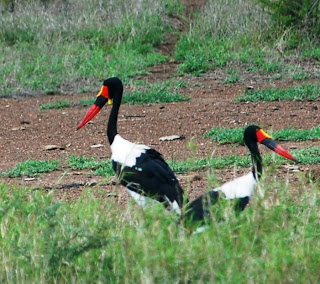
(Saddle-billed Storks, Kruger National Park)
We got up early to explore the roads west of Satara thinking that is the direction that the roaring came from last night. West of the camp we saw birders taking photos with a giant Canon lens and a big sign on the back of their vehicle that read "Bird Watching -- Please Drive Around". Sure enough we saw lions guarding the carcass of a Cape Buffalo from a group of vultures. If the vultures landed near the carcass, the lions would arouse themselves and chase the vultures away.
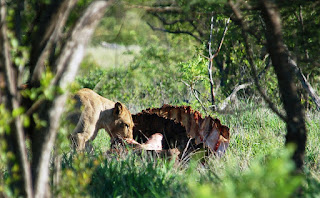
(One of a pride of lions fending off vultures from their latest kill -- a Cape Buffalo, on the S40 near Satara, Kruger National Park)
Moved into a rondavel with air conditioning. The boys promptly fell asleep basking in this luxury. We are seeing lots of game on all of our drives but in discussing our move to Skukuza Rest Camp, we speculate (incorrectly it turns out) that we will see far fewer birds and animals when we move there. We had heard from the South African family at Balule Camp that Skukuza is large and crowded -- so this spurs us into making the most out of our stay at Satara and we schedule long drives.

(Our rondavel at Satara Rest Camp, Kruger National Park)
We have dinner at the restaurant again with Jeff very helpful and engaged. Will wonders if Carole is tired and ready for the trip to be over. The rondavel is crowded with four people but the relative comfort, and the little veranda/cooking area and facilities restore everyone to good humor.
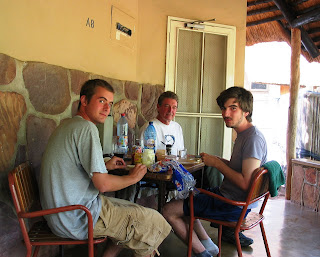
(Spirits restored -- Will on the left, Jeff on the right with Dad drinking some spirits on the veranda of our rondavel at Satara Rest Camp, Kruger National Park)

(Saddle-billed Storks, Kruger National Park)
We got up early to explore the roads west of Satara thinking that is the direction that the roaring came from last night. West of the camp we saw birders taking photos with a giant Canon lens and a big sign on the back of their vehicle that read "Bird Watching -- Please Drive Around". Sure enough we saw lions guarding the carcass of a Cape Buffalo from a group of vultures. If the vultures landed near the carcass, the lions would arouse themselves and chase the vultures away.

(One of a pride of lions fending off vultures from their latest kill -- a Cape Buffalo, on the S40 near Satara, Kruger National Park)
Moved into a rondavel with air conditioning. The boys promptly fell asleep basking in this luxury. We are seeing lots of game on all of our drives but in discussing our move to Skukuza Rest Camp, we speculate (incorrectly it turns out) that we will see far fewer birds and animals when we move there. We had heard from the South African family at Balule Camp that Skukuza is large and crowded -- so this spurs us into making the most out of our stay at Satara and we schedule long drives.
(Our rondavel at Satara Rest Camp, Kruger National Park)
We have dinner at the restaurant again with Jeff very helpful and engaged. Will wonders if Carole is tired and ready for the trip to be over. The rondavel is crowded with four people but the relative comfort, and the little veranda/cooking area and facilities restore everyone to good humor.
(Spirits restored -- Will on the left, Jeff on the right with Dad drinking some spirits on the veranda of our rondavel at Satara Rest Camp, Kruger National Park)
Labels: Satara Rest Camp, Skukuza Rest Camp
Tuesday, April 22, 2008
Camping at Satara: Friday, January 5, 2007

(No question as to who has the the right-of-way, Kruger National Park)
Will, Carole and Jeff go on a game drive in the morning. I am happy to remain at the camp site to plan ahead now that the trip itinerary has changed and catch up with this journal. They return and decide to pass on the guided nighttime drive at R 120 per person. We set out for Shingwedzi and have lunch at Letaba.
Our game drive is very successful so we feel quite satisfied and camp again at Satara as planned. Today we saw a large group of Cape Buffalo. I hear lions roaring to the west of the camp during the night. Very comfortable except for the condition of the ablution block -- chiefly the smell which is quite bad.

(Part of the large group of Cape Buffalo that halted us on the road for many minutes while they slowly crossed, Kruger National Park)
(No question as to who has the the right-of-way, Kruger National Park)
Will, Carole and Jeff go on a game drive in the morning. I am happy to remain at the camp site to plan ahead now that the trip itinerary has changed and catch up with this journal. They return and decide to pass on the guided nighttime drive at R 120 per person. We set out for Shingwedzi and have lunch at Letaba.
Our game drive is very successful so we feel quite satisfied and camp again at Satara as planned. Today we saw a large group of Cape Buffalo. I hear lions roaring to the west of the camp during the night. Very comfortable except for the condition of the ablution block -- chiefly the smell which is quite bad.
(Part of the large group of Cape Buffalo that halted us on the road for many minutes while they slowly crossed, Kruger National Park)
Labels: Letaba, Satara Rest Camp, Shingwedzi
Tuesday, April 08, 2008
In Trouble With the Police (Again): Thursday, January 4, 2007

(A male Steenbok, Kruger National Park)
We broke camp and drove toward the Giriyondo Border Post on our way to the Covane Community Lodge (our neighbors got away at 5:30 AM). Part of the immigration formalities required a check of our vehicle and its papers. The rest of the family was inside going through immigration (visa applications) and entry into Mozambique. In the car and truck port outside, I was informed by the sergeant on duty that he must fine me for "having a dirty engine". Inside, the customs authority is asking for my papers including the truck title and insurance documents which the sergeant has taken from me. I shuttle back and forth -- the officials inside increasingly uneasy about the delay. I argued a bit with the sergeant, asking how I was expected to arrive at Giriyondo with "a clean engine" after having been deep in the mud in Zambia and so forth. I am told that "just as a man should bathe each day" -- I should have bathed my truck and that the rest camps have car washing facilities.
This was news to me (later I spotted such a facility) and was convinced that this was just a pretext to shake some Rand out of me. The truck engine was not really that dirty. When my family learned about the demand, they staged a mutiny and basically refused to cross into Mozambique (we had quite a few steps left in the immigration process anyway -- but by now their passports were on a desk in the office). I had held onto mine having learned that my International Drivers License would substitute as the ID often demanded by the police at road checks and -- I had become very leery of handing my passport over to anyone except immigration officers.
So there I was. My philosophy has been to just push past all obstacles in life -- but they are concerned that if the South African police are going to be this difficult then the authorities in Mozambique will be much worse and that we will lose the truck. I argued with the family but to no avail (three against one). Feeling bad about the reservation I made previously with the community run lodge, I managed to reach the manager (I had called him previously from the States) on my cell phone and explained why I was compelled to cancel our stay in Mozambique.
We went back into immigration and announced that we wanted the passports back and why. A group of workers passing in the opposite direction into the RSA from Mozambique looked distressed for us as we explained the sergeant's position about our truck. The immigration officials were embarrassed too but said little. The visas were turned in and canceled.
Outside I demanded my truck papers back from the sergeant who was so surprised he handed them back with almost no protest. I said we had canceled our trip into Mozambique -- saying that we had no desire to deal with the police in Mozambique if he was going to be such a big problem. He protested "that this was not necessary and that something could be worked out" but I said we had made a final decision and that was that (I was happy not to be arrested again after confronting him directly this way). We went through all of our documents, determined that they were all there, and made our way to the part of the building housing the National Park employees. They were aware of the contretemps and were very helpful in redoing our itinerary and securing us a camp site in the Satara Rest Camp and on subsequent nights a chalet there and later at Skukuza Rest Camp.
We drove back to Satara and moved into our camp site. The grounds were crisscrossed with electrical cables as camping here is almost a competitive sport (it is probably more so in the U. S. now although I had abandoned it as soon as I could afford hotels). I camped in the U. S. as a poor migrant (literally). Here in South Africa -- compared to the other campers -- we are again poor Okies or Arkies. People here have every sort of electrical and recreational convenience and once again we are befriended by our neighbors and made to feel very welcome in South Africa. At the end of the day our only complaint is that the ablution block left something to be desired -- but the heavy traffic from the full camp site was sufficient explanation. And after all, being in Kruger National Park is sufficient in and of itself.

(Sunset, Kruger National Park)
(A male Steenbok, Kruger National Park)
We broke camp and drove toward the Giriyondo Border Post on our way to the Covane Community Lodge (our neighbors got away at 5:30 AM). Part of the immigration formalities required a check of our vehicle and its papers. The rest of the family was inside going through immigration (visa applications) and entry into Mozambique. In the car and truck port outside, I was informed by the sergeant on duty that he must fine me for "having a dirty engine". Inside, the customs authority is asking for my papers including the truck title and insurance documents which the sergeant has taken from me. I shuttle back and forth -- the officials inside increasingly uneasy about the delay. I argued a bit with the sergeant, asking how I was expected to arrive at Giriyondo with "a clean engine" after having been deep in the mud in Zambia and so forth. I am told that "just as a man should bathe each day" -- I should have bathed my truck and that the rest camps have car washing facilities.
This was news to me (later I spotted such a facility) and was convinced that this was just a pretext to shake some Rand out of me. The truck engine was not really that dirty. When my family learned about the demand, they staged a mutiny and basically refused to cross into Mozambique (we had quite a few steps left in the immigration process anyway -- but by now their passports were on a desk in the office). I had held onto mine having learned that my International Drivers License would substitute as the ID often demanded by the police at road checks and -- I had become very leery of handing my passport over to anyone except immigration officers.
So there I was. My philosophy has been to just push past all obstacles in life -- but they are concerned that if the South African police are going to be this difficult then the authorities in Mozambique will be much worse and that we will lose the truck. I argued with the family but to no avail (three against one). Feeling bad about the reservation I made previously with the community run lodge, I managed to reach the manager (I had called him previously from the States) on my cell phone and explained why I was compelled to cancel our stay in Mozambique.
We went back into immigration and announced that we wanted the passports back and why. A group of workers passing in the opposite direction into the RSA from Mozambique looked distressed for us as we explained the sergeant's position about our truck. The immigration officials were embarrassed too but said little. The visas were turned in and canceled.
Outside I demanded my truck papers back from the sergeant who was so surprised he handed them back with almost no protest. I said we had canceled our trip into Mozambique -- saying that we had no desire to deal with the police in Mozambique if he was going to be such a big problem. He protested "that this was not necessary and that something could be worked out" but I said we had made a final decision and that was that (I was happy not to be arrested again after confronting him directly this way). We went through all of our documents, determined that they were all there, and made our way to the part of the building housing the National Park employees. They were aware of the contretemps and were very helpful in redoing our itinerary and securing us a camp site in the Satara Rest Camp and on subsequent nights a chalet there and later at Skukuza Rest Camp.
We drove back to Satara and moved into our camp site. The grounds were crisscrossed with electrical cables as camping here is almost a competitive sport (it is probably more so in the U. S. now although I had abandoned it as soon as I could afford hotels). I camped in the U. S. as a poor migrant (literally). Here in South Africa -- compared to the other campers -- we are again poor Okies or Arkies. People here have every sort of electrical and recreational convenience and once again we are befriended by our neighbors and made to feel very welcome in South Africa. At the end of the day our only complaint is that the ablution block left something to be desired -- but the heavy traffic from the full camp site was sufficient explanation. And after all, being in Kruger National Park is sufficient in and of itself.
(Sunset, Kruger National Park)
Labels: Giriyondo Border Post, Satara Rest Camp
Sunday, March 30, 2008
Hyenas Are Very Large: Wednesday, January 3, 2007

(A panoramic view east at the bridge on the H1-6 crossing the Letaba River on the way south to Balule Camp, Kruger National Park: double click on the image and you will be able to magnify the image and pan across it using the "slider". There are elephants feeding on the southern bank.)
We packed up and drove to Balule Camp via Letaba Rest Camp for lunch and Olifants Rest Camp in order to register for Balule (a satellite of Olifants). We arrived to occupy the last open site at Balule (I had reserved it long in advance). There was the initial awkwardness of getting settled in the narrowly confined camp -- but we were beginning to vaguely understand the local preference or need (really) for "laagering up" at night due the presence of large game. Once we had finished setting up, our neighbors invited us over to their site to look at "something". Standing with its nose next to the chain link fence was a fully grown hyena. It was joined by two others but the new arrivals didn't approach as close to us. The hyena must have stood 40 or more inches high and was much more massively built than a dog. Their great size was a revelation. Eying our neighbors' little daughter it was clearly entertaining thoughts of a meal of some sort. While the Park is constantly warning visitors not to feed the animals -- particularly the hyenas -- people do so anyway. While it is easy to understand why this policy is very wise it nevertheless provided us with quite an experience. Our neighbors were not feeding them, in fact the father was explaining to his daughter how he dealt with them safely in the wild as a soldier. But the bad behavior of previous guests had made the hyenas bold and thus willing to stand just inches away from us so we could get a really close up look at them.
I didn't want to scare the hyenas off with flash photography (it was nearly nightfall) and therefore ruin the show for everyone so you must just imagine looking into their faces and at their rough, spotted fur at a very short distance.

(A grey heron in the Letaba River near the the bridge on the H1-6, Kruger National Park)

(A panoramic view east at the bridge on the H1-6 crossing the Letaba River on the way south to Balule Camp, Kruger National Park: double click on the image and you will be able to magnify the image and pan across it using the "slider". There are elephants feeding on the southern bank.)
We packed up and drove to Balule Camp via Letaba Rest Camp for lunch and Olifants Rest Camp in order to register for Balule (a satellite of Olifants). We arrived to occupy the last open site at Balule (I had reserved it long in advance). There was the initial awkwardness of getting settled in the narrowly confined camp -- but we were beginning to vaguely understand the local preference or need (really) for "laagering up" at night due the presence of large game. Once we had finished setting up, our neighbors invited us over to their site to look at "something". Standing with its nose next to the chain link fence was a fully grown hyena. It was joined by two others but the new arrivals didn't approach as close to us. The hyena must have stood 40 or more inches high and was much more massively built than a dog. Their great size was a revelation. Eying our neighbors' little daughter it was clearly entertaining thoughts of a meal of some sort. While the Park is constantly warning visitors not to feed the animals -- particularly the hyenas -- people do so anyway. While it is easy to understand why this policy is very wise it nevertheless provided us with quite an experience. Our neighbors were not feeding them, in fact the father was explaining to his daughter how he dealt with them safely in the wild as a soldier. But the bad behavior of previous guests had made the hyenas bold and thus willing to stand just inches away from us so we could get a really close up look at them.
I didn't want to scare the hyenas off with flash photography (it was nearly nightfall) and therefore ruin the show for everyone so you must just imagine looking into their faces and at their rough, spotted fur at a very short distance.
(A grey heron in the Letaba River near the the bridge on the H1-6, Kruger National Park)
Labels: Balule Camp, Kruger National Park
Friday, March 28, 2008
North to Parfuri Border Post and Crooks Corner: Tuesday, January 2, 2007

(Crocodiles on a sand bar -- Crooks Corner near the confluence of the Luvuvhu and Limpopo Rivers, Kruger National Park/Great Limpopo Transfrontier Park)
Anticipating our trip to Mozambique, we drive north and east to the Parfuri Border Post. The antelope we spot along the S63 loop are among the finest I see in Africa (for variety). We are advised (unofficially) at the Border Post to have our papers for the truck in perfect order as the police on the other side will seize upon any reason to confiscate the vehicle and sell it as a side business. The visa has been increased to 170 Rand (about USD $25) per person plus 200 Rand for the truck and so forth (more Third Party Insurance is required too apparently).
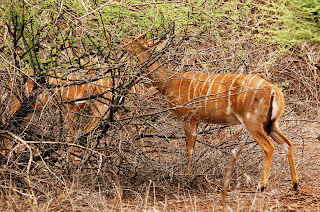
(Female bushbucks east bound on the S63 Loop Road toward Crooks Corner, Kruger National Park)

(Female bushbuck panting from the heat -- east bound on the S63 Loop Road toward Crooks Corner, Kruger National Park)

(Male impala on the S63 Loop Road on the way to Crooks Corner, Kruger National Park)
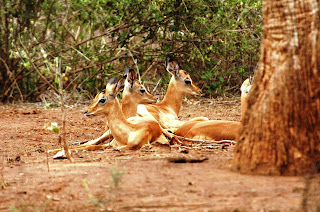
(Impala fawns under a tree on the S63 Loop Road east bound toward Crooks Corner, Kruger National Park: it appears that they share a strategy similar to springboks -- leaving the very young semi-hidden while the adults graze nearby)
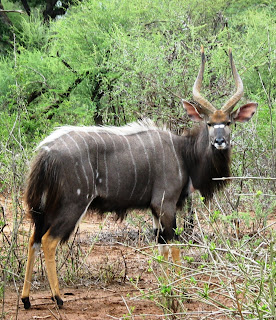
(Male nyala on the S63 Loop Road east bound toward Crooks Corner, Kruger National Park)
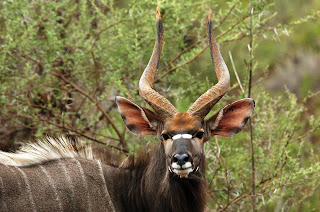
(Close-up of a male nyala on the S63 Loop Road east bound toward Crooks Corner, Kruger National Park: it is distinguished from the kudu "in that the male's horns are shorter and twisted" whereas those of the male kudu are spiralled and "the white bar between the eyes is broken in the middle" -- Visitors Guide)
At the Crooks Corner picnic and "Get-out point" we help a group with a dead battery. We jump off their Land Rover successfully (with our battery and their cables).

(Vervet monkey at the Crooks Corner Get-out Point and Picnic Area, Kruger National Park)
We end the day discussing Mozambique and the practicality of going all the way to Tofo based upon the amount of time we have allotted for this portion of the trip. I am reluctant to give this up but agree because I plan to go to Mozambique when I return to Africa and maybe we will be a bit of an embarrassment for Will and Jeff: "Ma and Pa Kettle visit Cancun" or some such travesty...

(A warthog tinted with local red soil trots into view, on the S63 Loop Road east bound toward Crooks Corner, Kruger National Park)
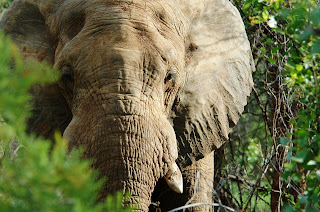
(Elephant close-up -- north of Punda Maria Rest Camp, Kruger National Park)

(African fish eagle north of Punda Maria Rest Camp, Kruger National Park)

(Tawny eagle north of Punda Maria Rest Camp, Kruger National Park)
At this point we are still on for the Covane Lodge in the Great Limpopo Transfrontier Park on the Mozambique side but I sense that the information we got at Parfuri has put a damper on things. My arrests in Zambia didn't bother me but it did bother the rest of the family.

(Nyala in profile on the S63 Loop Road east bound toward Crooks Corner, Kruger National Park)

(Crocodiles on a sand bar -- Crooks Corner near the confluence of the Luvuvhu and Limpopo Rivers, Kruger National Park/Great Limpopo Transfrontier Park)
Anticipating our trip to Mozambique, we drive north and east to the Parfuri Border Post. The antelope we spot along the S63 loop are among the finest I see in Africa (for variety). We are advised (unofficially) at the Border Post to have our papers for the truck in perfect order as the police on the other side will seize upon any reason to confiscate the vehicle and sell it as a side business. The visa has been increased to 170 Rand (about USD $25) per person plus 200 Rand for the truck and so forth (more Third Party Insurance is required too apparently).
(Female bushbucks east bound on the S63 Loop Road toward Crooks Corner, Kruger National Park)
(Female bushbuck panting from the heat -- east bound on the S63 Loop Road toward Crooks Corner, Kruger National Park)

(Male impala on the S63 Loop Road on the way to Crooks Corner, Kruger National Park)
(Impala fawns under a tree on the S63 Loop Road east bound toward Crooks Corner, Kruger National Park: it appears that they share a strategy similar to springboks -- leaving the very young semi-hidden while the adults graze nearby)

(Male nyala on the S63 Loop Road east bound toward Crooks Corner, Kruger National Park)
(Close-up of a male nyala on the S63 Loop Road east bound toward Crooks Corner, Kruger National Park: it is distinguished from the kudu "in that the male's horns are shorter and twisted" whereas those of the male kudu are spiralled and "the white bar between the eyes is broken in the middle" -- Visitors Guide)
At the Crooks Corner picnic and "Get-out point" we help a group with a dead battery. We jump off their Land Rover successfully (with our battery and their cables).
(Vervet monkey at the Crooks Corner Get-out Point and Picnic Area, Kruger National Park)
We end the day discussing Mozambique and the practicality of going all the way to Tofo based upon the amount of time we have allotted for this portion of the trip. I am reluctant to give this up but agree because I plan to go to Mozambique when I return to Africa and maybe we will be a bit of an embarrassment for Will and Jeff: "Ma and Pa Kettle visit Cancun" or some such travesty...
(A warthog tinted with local red soil trots into view, on the S63 Loop Road east bound toward Crooks Corner, Kruger National Park)
(Elephant close-up -- north of Punda Maria Rest Camp, Kruger National Park)

(African fish eagle north of Punda Maria Rest Camp, Kruger National Park)

(Tawny eagle north of Punda Maria Rest Camp, Kruger National Park)
At this point we are still on for the Covane Lodge in the Great Limpopo Transfrontier Park on the Mozambique side but I sense that the information we got at Parfuri has put a damper on things. My arrests in Zambia didn't bother me but it did bother the rest of the family.

(Nyala in profile on the S63 Loop Road east bound toward Crooks Corner, Kruger National Park)
Labels: Crooks Corner, Kruger National Park, Parfuri Border Post, Punda Maria Rest Camp
Wanderings South of Punda Maria Rest Camp: Monday, January 1, 2007

(Zebras grazing south of Punda Maria Rest Camp, Kruger National Park)
It rained all night and well into the morning. We set out on a game drive south of the rest camp. By the end of the day we have added greatly to Jeff's list of African game: more elephants (those in Botswana by the side of the highway made an impression it seems); zebras; giraffes; wildebeests; Cape Buffalo; Southern Ground Horn bills (rare and endangered I think); impalas; springboks; baboons.

(Not the best photo, but it gives you an idea of how close we are: on the H13-2 east of Punda Maria; shooting over Will's shoulder with a Canon G3; Will with his Nikon D50 and VR80-400 mm AF lens)
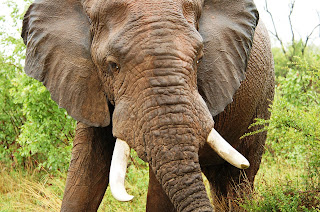
(A young elephant regards us calmly: on the H13-2 east of Punda Maria Rest Camp, Kruger National Park)

(A close up of the same subject in the same location)

(And an extreme close-up of the same subject in the same location)
The giant cat fish thrashing around in a rapidly drying water hole yesterday have been rescued by the rains. A fish eagle perched over them will now have a little more trouble selecting a meal.

(Giraffes browsing on landscape typical to this part of Kruger National Park -- south and east of Punda maria Rest Camp)

(A Southern Ground Horn Bill (one of a pair) on the H1-7 south of Punda Maria Rest Camp)
Back to the chalet for more luxury, the news of the day on television, and a good meal.

(A young male baboon sits for his portrait -- south of Punda Maria Rest Camp)

(Zebras grazing south of Punda Maria Rest Camp, Kruger National Park)
It rained all night and well into the morning. We set out on a game drive south of the rest camp. By the end of the day we have added greatly to Jeff's list of African game: more elephants (those in Botswana by the side of the highway made an impression it seems); zebras; giraffes; wildebeests; Cape Buffalo; Southern Ground Horn bills (rare and endangered I think); impalas; springboks; baboons.
(Not the best photo, but it gives you an idea of how close we are: on the H13-2 east of Punda Maria; shooting over Will's shoulder with a Canon G3; Will with his Nikon D50 and VR80-400 mm AF lens)
(A young elephant regards us calmly: on the H13-2 east of Punda Maria Rest Camp, Kruger National Park)
(A close up of the same subject in the same location)

(And an extreme close-up of the same subject in the same location)
The giant cat fish thrashing around in a rapidly drying water hole yesterday have been rescued by the rains. A fish eagle perched over them will now have a little more trouble selecting a meal.
(Giraffes browsing on landscape typical to this part of Kruger National Park -- south and east of Punda maria Rest Camp)
(A Southern Ground Horn Bill (one of a pair) on the H1-7 south of Punda Maria Rest Camp)
Back to the chalet for more luxury, the news of the day on television, and a good meal.
(A young male baboon sits for his portrait -- south of Punda Maria Rest Camp)
Monday, March 24, 2008
The Doctor Is In: Sunday, New Years Eve, 2006
This morning it is clear that Will needs medical attention: his ear is bright red and swollen and there are red lines radiating from a central site on his ear that are clearly infected. The proprietor at Dongola Ranch gave us directions to the private clinic in Messina (Musina) which we found without too much difficulty. We are amazed and grateful to find the clinic open on a Sunday and a holiday. The staff fit us into the existing appointment schedule and after a wait of only 30 to 40 minutes; Will is examined by the doctor. A fellow patient in the waiting room helpfully made his own diagnosis: a bite by a poisonous spider. The doctor confirms this (the patient had been bitten on his leg by a violin spider and had the scar to prove it). The doctor spent some time with Will chatting about the bite and his Peace Corps experience. Armed with the doctor's prescriptions, we waited in the office for the results of some tests (to rule out tick bite fever and to meet Will's request for a checkup on his status vis a vis malaria) all of which come back very quickly. After the visit to the pharmacy in the shopping center we total up the costs for the visit, testing, and three prescriptions -- 250 Rand or about USD $35.00
The low cost is just as amazing to us as finding the so-called private clinic open: this would have been a very expensive visit to the doctor in the U. S. This diagnosis also cleared up the mystery of what was ailing Will -- it was clear that the bite happened in Selebi-Phikwe in Botswana two days before.
After stocking up with food at the SPAR in Messina and buying diesel fuel for the truck, we set out again for the Punda Maria Rest Camp via R525 and the Parfuri Gate at the northern end of Kruger National Park.
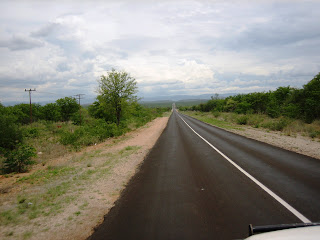
(On the R525 heading east from Messina toward the Parfuri Gate, northernmost entrance to Kruger National Park)
We arrived at the gate and registered -- and still were left with plenty of time to observe the speed limit of 50 kilometers per hour (averaging 25 kph) and reach the gate of the rest camp by dark before the gates to the camp would close. We saw game almost immediately: here waterbucks feeding alongside a river bank, there Cape Buffaloes grazing along the road.

(Bridge on the H1-9 crossing the Luvuvhu River on the way south to Punda Maria Rest Camp, Kruger National Park -- waterbucks feeding on the banks)
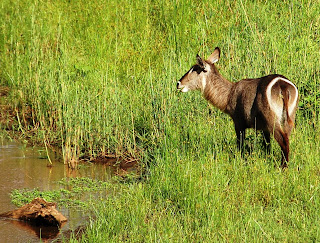
(Close up of a waterbuck feeding on the bank of the Luvuvhu River, H1-9 bridge in Kruger National Park heading south to Punda Maria Rest Camp)
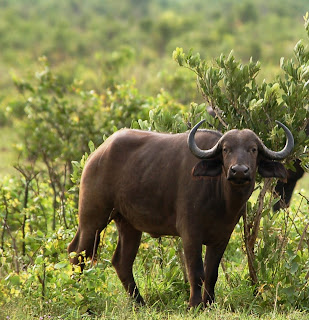
( A Cape Buffalo grazing near H1-8 inside Kruger National Park on the way to Punda Maria Rest Camp)
Punda Maria lived up to its reputation -- retaining an uncrowded feel even now and fully booked at the height of the holiday season. We had reserved a luxury chalet to celebrate the New Year and it was very deluxe, especially after camping.
We put together a meal and celebrated New Years Eve by watching the eccentric and ridiculous R. Kelly video "Trapped in the Closet" on South African television. Being very tired from a long day, none of us made it to midnight but we all spent some time wondering about what South Africans might think of life in the U. S. after watching this epic.
This morning it is clear that Will needs medical attention: his ear is bright red and swollen and there are red lines radiating from a central site on his ear that are clearly infected. The proprietor at Dongola Ranch gave us directions to the private clinic in Messina (Musina) which we found without too much difficulty. We are amazed and grateful to find the clinic open on a Sunday and a holiday. The staff fit us into the existing appointment schedule and after a wait of only 30 to 40 minutes; Will is examined by the doctor. A fellow patient in the waiting room helpfully made his own diagnosis: a bite by a poisonous spider. The doctor confirms this (the patient had been bitten on his leg by a violin spider and had the scar to prove it). The doctor spent some time with Will chatting about the bite and his Peace Corps experience. Armed with the doctor's prescriptions, we waited in the office for the results of some tests (to rule out tick bite fever and to meet Will's request for a checkup on his status vis a vis malaria) all of which come back very quickly. After the visit to the pharmacy in the shopping center we total up the costs for the visit, testing, and three prescriptions -- 250 Rand or about USD $35.00
The low cost is just as amazing to us as finding the so-called private clinic open: this would have been a very expensive visit to the doctor in the U. S. This diagnosis also cleared up the mystery of what was ailing Will -- it was clear that the bite happened in Selebi-Phikwe in Botswana two days before.
After stocking up with food at the SPAR in Messina and buying diesel fuel for the truck, we set out again for the Punda Maria Rest Camp via R525 and the Parfuri Gate at the northern end of Kruger National Park.
(On the R525 heading east from Messina toward the Parfuri Gate, northernmost entrance to Kruger National Park)
We arrived at the gate and registered -- and still were left with plenty of time to observe the speed limit of 50 kilometers per hour (averaging 25 kph) and reach the gate of the rest camp by dark before the gates to the camp would close. We saw game almost immediately: here waterbucks feeding alongside a river bank, there Cape Buffaloes grazing along the road.
(Bridge on the H1-9 crossing the Luvuvhu River on the way south to Punda Maria Rest Camp, Kruger National Park -- waterbucks feeding on the banks)

(Close up of a waterbuck feeding on the bank of the Luvuvhu River, H1-9 bridge in Kruger National Park heading south to Punda Maria Rest Camp)

( A Cape Buffalo grazing near H1-8 inside Kruger National Park on the way to Punda Maria Rest Camp)
Punda Maria lived up to its reputation -- retaining an uncrowded feel even now and fully booked at the height of the holiday season. We had reserved a luxury chalet to celebrate the New Year and it was very deluxe, especially after camping.
We put together a meal and celebrated New Years Eve by watching the eccentric and ridiculous R. Kelly video "Trapped in the Closet" on South African television. Being very tired from a long day, none of us made it to midnight but we all spent some time wondering about what South Africans might think of life in the U. S. after watching this epic.
Labels: Dongola Ranch, Kruger National Park, Messina (Musina), Parfuri Gate, Punda Maria Rest Camp
